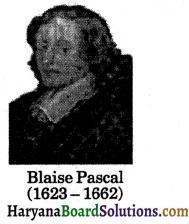Haryana State Board HBSE 9th Class Maths Notes Chapter 15 Probability Notes.
Haryana Board 9th Class Maths Notes Chapter 15 Probability
Introduction
In every life, we come across statements such as:
(i) Most probably it will rain today.
(ii) I doubt that he will pass in the examination.
(iii) Chances are high that price of gold will go up.
(iv) Probably Mumbai Indian team wins the IPL cricket tournament 2013.
In the above statements the words ‘most probably’, ‘doubt’, ‘chances’, ‘probably’ etc. shows uncertainty or probability of occurrence of some particular event. Through probability started with gambling, it has been used extensively in Science, Biological Science, Commerce, Weather Forecasting etc.
![]()
Key Words
→ Probability: Probability is a numerical measure of the likelihood that a specific event will occur.
→ Empirical probability: Probability that is based on some event occuring, which is calculated using collected empirical evidence.
→ Experiment: An experiment is a process which ends in some well defined result.
→ Outcome: A particular result of an experiment is called an outcome.
→ Random Experiment: An experiment in which all possible outcomesare known and the exact outcome cannot be predicted in advance, is called a random experiment.
→ Trial: Performing an experiment once is called a trial.
→ Events: The possible outcomes of an experiment are called events.
→ Impossible event: An event that has no chance of occuring is called an impossible event. The probability of impossible event is zero.
→ Sure event: An event that has a 100% probability of occuring is called sure event. The probability of sure event is 1.
→ Elementary Event: An event having only one outcome is called an elementary event. The sum of all the elementary events of an experiment is 1.
→ Equally likely events: Equally likely events are such events that have the equal chance to happen to an experiment.
→ Complementary events: Let E denotes the happening of an event and not E(or E) denotes its not happening, then E and not E are called complementary events.
Note: P(E) + P(not E) = 1.
![]()
Probability-an Experimental Approach:
(a) History of Probability: In 1654, a gambler Chevalier de Mere asked French philosopher and mathematician Blaise Pascal to solve certain dice problems. Pascal became interested to solve this problem and discussed them with French mathematician, Pierre de Fermat. Both solved the problems independently. This work was beginning of Probability Theory. The Italian mathematician, J. Cardan (1501-1576) wrote a book “Book on Games of Chance”. It was published by Liber de Ludo Aleae in 1663.


In developing the theory of probability notable contributions were also made by following mathematicians:
1. J. Bernoulli (1654 – 1705)
2. P. Laplace (1749 – 1827)
3. A. A. Markov (1856 – 1922)
4. A. N. Kolmogorov (born 1903)
b. Different Approaches to Probaility: There are three approaches to theory of probability:
(i) Experiment or empirical or observed frequency approach.
(ii) Classical approach.
(iii) Axiomatic approach.
In this chapter, we will study only experimental or empirical probability. The remaining two approaches would have been studying in higher classes.
Experimental or Empirical Probability: Let n be total number of possible outcomes. The empirical probability P(E) of an event E happening, is given by
P(E) = \(\frac{\text { Number of favourable outcomes }}{\text { Total number of possible outcomes }}\)
Read More: